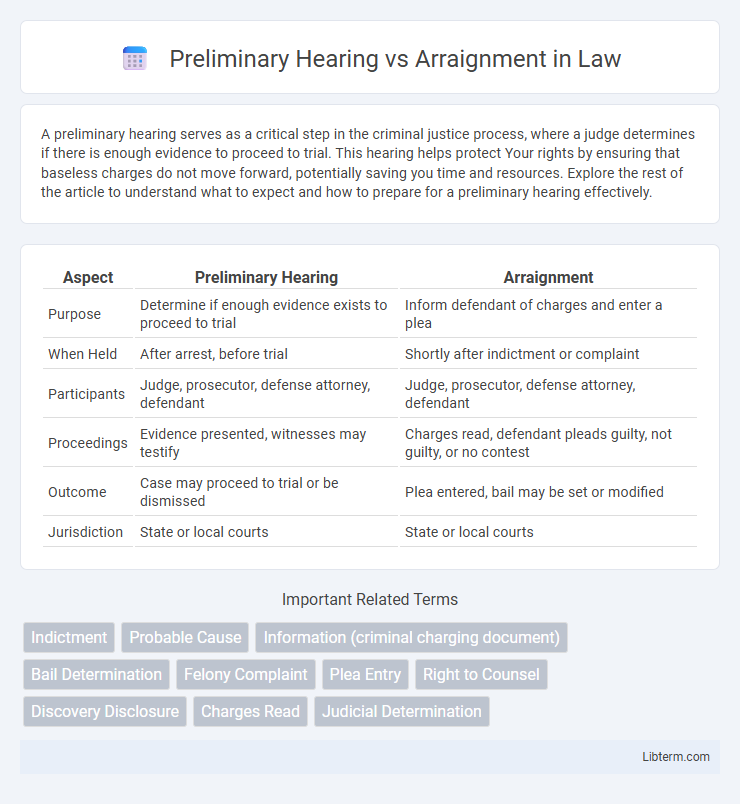A preliminary hearing serves as a critical step in the criminal justice process, where a judge determines if there is enough evidence to proceed to trial. This hearing helps protect Your rights by ensuring that baseless charges do not move forward, potentially saving you time and resources. Explore the rest of the article to understand what to expect and how to prepare for a preliminary hearing effectively.
Table of Comparison
| Aspect | Preliminary Hearing | Arraignment |
|---|---|---|
| Purpose | Determine if enough evidence exists to proceed to trial | Inform defendant of charges and enter a plea |
| When Held | After arrest, before trial | Shortly after indictment or complaint |
| Participants | Judge, prosecutor, defense attorney, defendant | Judge, prosecutor, defense attorney, defendant |
| Proceedings | Evidence presented, witnesses may testify | Charges read, defendant pleads guilty, not guilty, or no contest |
| Outcome | Case may proceed to trial or be dismissed | Plea entered, bail may be set or modified |
| Jurisdiction | State or local courts | State or local courts |
Introduction to Preliminary Hearings and Arraignments
Preliminary hearings determine whether sufficient evidence exists to proceed to trial, typically involving the presentation of prosecutor's evidence and witness testimony before a judge. Arraignments formally charge the defendant, ensuring they understand the accusations and enter a plea such as guilty, not guilty, or no contest. Both stages are crucial in criminal proceedings, serving distinct roles: preliminary hearings assess probable cause, while arraignments establish official court appearances and plea records.
Definition of Preliminary Hearing
A preliminary hearing is a legal proceeding where a judge determines if there is enough evidence to proceed to trial, ensuring probable cause exists against the defendant. It occurs after arraignment, which is the initial court appearance where charges are formally presented, and the defendant enters a plea. Unlike arraignment, the preliminary hearing involves witness testimonies and examination of evidence to evaluate the prosecution's case strength.
Definition of Arraignment
Arraignment is a formal court proceeding where the defendant is officially informed of the charges and asked to enter a plea, such as guilty, not guilty, or no contest. It marks the first step in the criminal justice process following an arrest, ensuring the defendant understands the accusations and their rights. Unlike a preliminary hearing, which evaluates probable cause to proceed, arraignment focuses on plea entry and scheduling future court dates.
Key Differences Between Preliminary Hearing and Arraignment
A preliminary hearing determines if sufficient evidence exists to proceed to trial, focusing on probable cause, while an arraignment involves formally reading charges and entering a plea. The preliminary hearing allows the defense to challenge evidence and witnesses, whereas the arraignment primarily addresses procedural rights and bail conditions. Timing also differs; preliminary hearings occur before trial to establish case validity, and arraignments follow the initial arrest to set the legal process in motion.
Legal Purpose of a Preliminary Hearing
The legal purpose of a preliminary hearing is to determine whether there is sufficient evidence to proceed to trial by establishing probable cause that the defendant committed the alleged crime. Unlike an arraignment, which primarily involves reading charges, entering a plea, and addressing bail, the preliminary hearing functions as a critical safeguard against unwarranted prosecutions. This hearing helps protect defendants' rights by ensuring that only cases with adequate evidence move forward in the judicial process.
Legal Purpose of an Arraignment
An arraignment serves the legal purpose of formally informing the defendant of the charges filed against them and allowing them to enter a plea, such as guilty, not guilty, or no contest. This process establishes the foundation for the criminal justice procedure by ensuring the defendant's rights are protected and setting the stage for subsequent court proceedings. Unlike a preliminary hearing, which assesses probable cause, the arraignment is primarily focused on plea entry and case management.
Rights of the Defendant at Each Stage
During a preliminary hearing, the defendant's rights include the ability to hear the prosecution's evidence, challenge the sufficiency of probable cause, and present their own evidence or witnesses to avoid indictment. At arraignment, the defendant is informed of the charges, advised of their constitutional rights--including the right to counsel and to remain silent--and enters a plea, which directly influences the progression of the case. Both stages underscore the protection of the defendant's due process rights, ensuring fairness while balancing the prosecution's burden of proof.
Outcomes of Preliminary Hearing vs Arraignment
Preliminary hearings determine if sufficient evidence exists to proceed to trial, often resulting in dismissal or advancement of charges, whereas arraignments focus on informing the defendant of charges and entering a plea, leading to bail settings or case scheduling. Outcomes of preliminary hearings can include release, bail, or indictment, while arraignments primarily result in plea acceptance or trial preparation orders. Understanding these distinct outcomes is crucial for navigating the criminal justice process effectively.
Timeline and Sequence in Criminal Proceedings
A preliminary hearing typically follows the arraignment in the criminal justice timeline, serving as a gauge to determine if sufficient evidence exists to proceed to trial. The arraignment occurs soon after arrest, where defendants are formally charged and enter pleas, establishing the initial stage of court proceedings. The sequence ensures the arraignment sets the foundation, while the preliminary hearing scrutinizes evidence before advancing the case.
Importance of Legal Representation During Hearings
Legal representation during preliminary hearings and arraignments is crucial for protecting a defendant's constitutional rights and ensuring fair legal procedures. Skilled attorneys can effectively challenge evidence, advise on plea options, and negotiate bail, directly impacting case outcomes. Without professional counsel, defendants risk misunderstanding charges and forfeiting critical opportunities for defense early in the judicial process.
Preliminary Hearing Infographic

 libterm.com
libterm.com